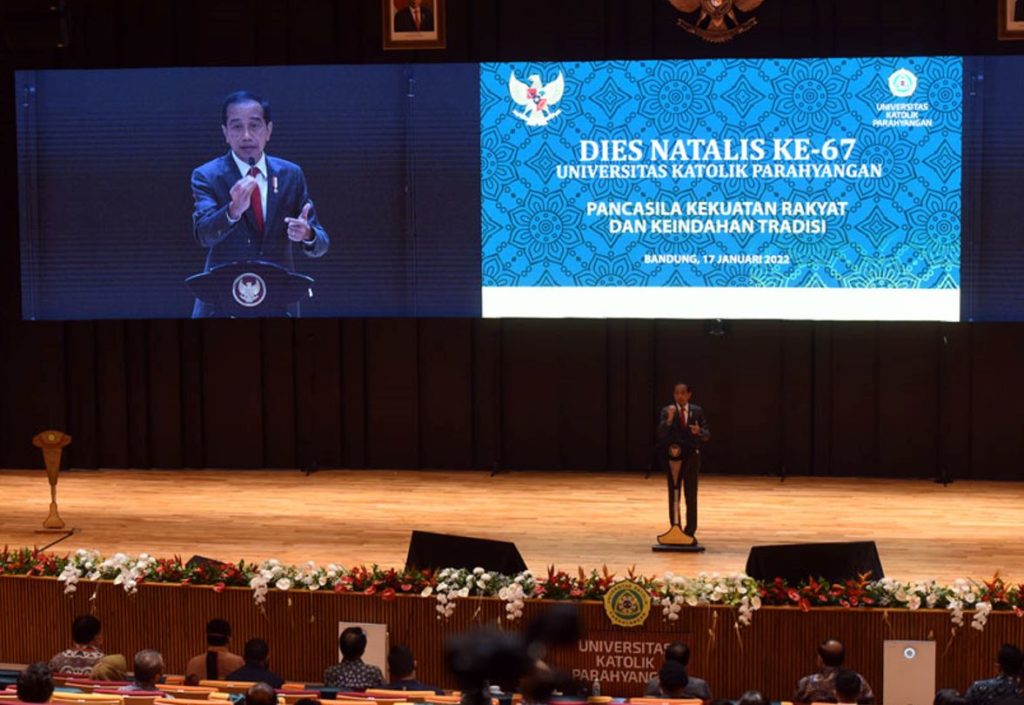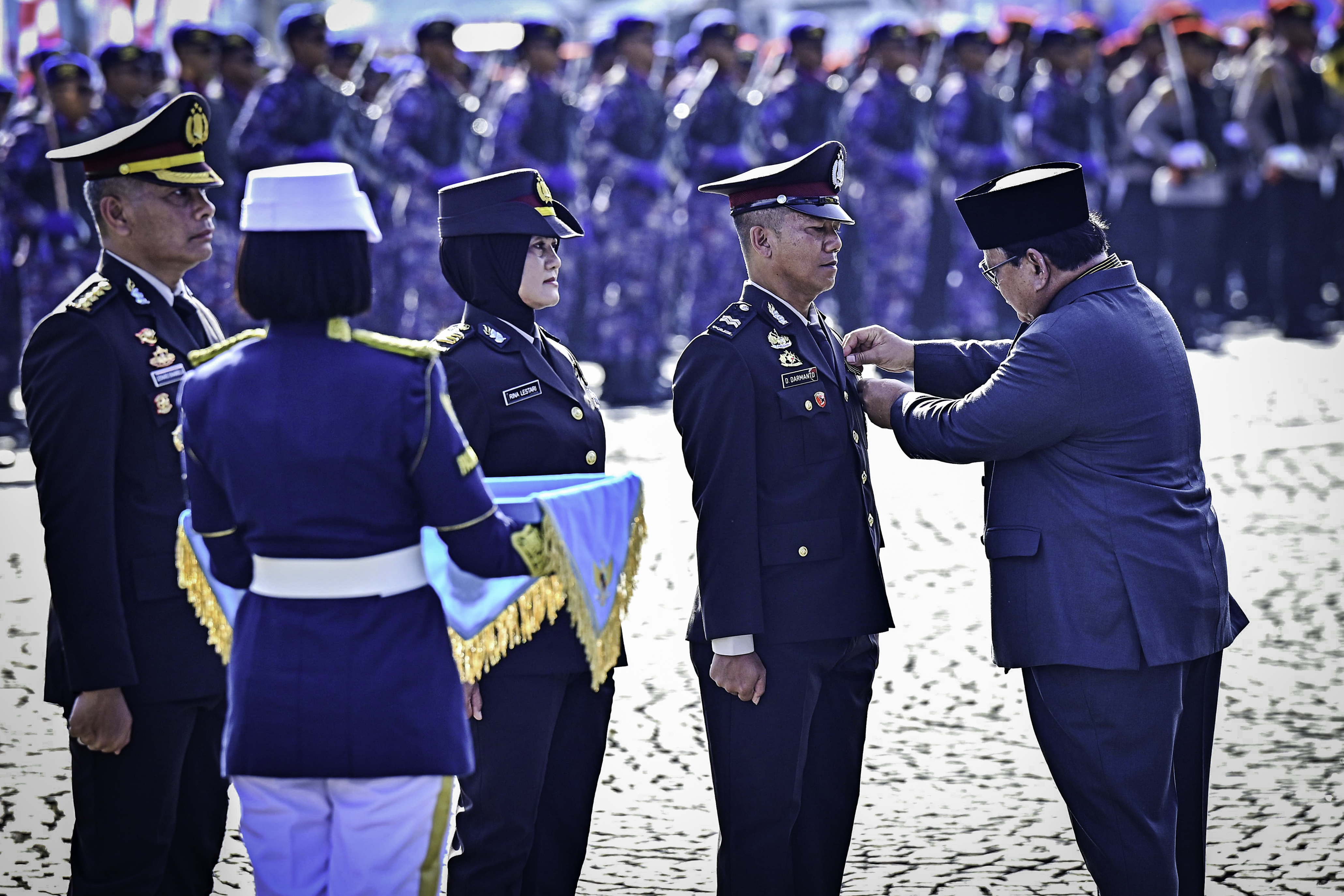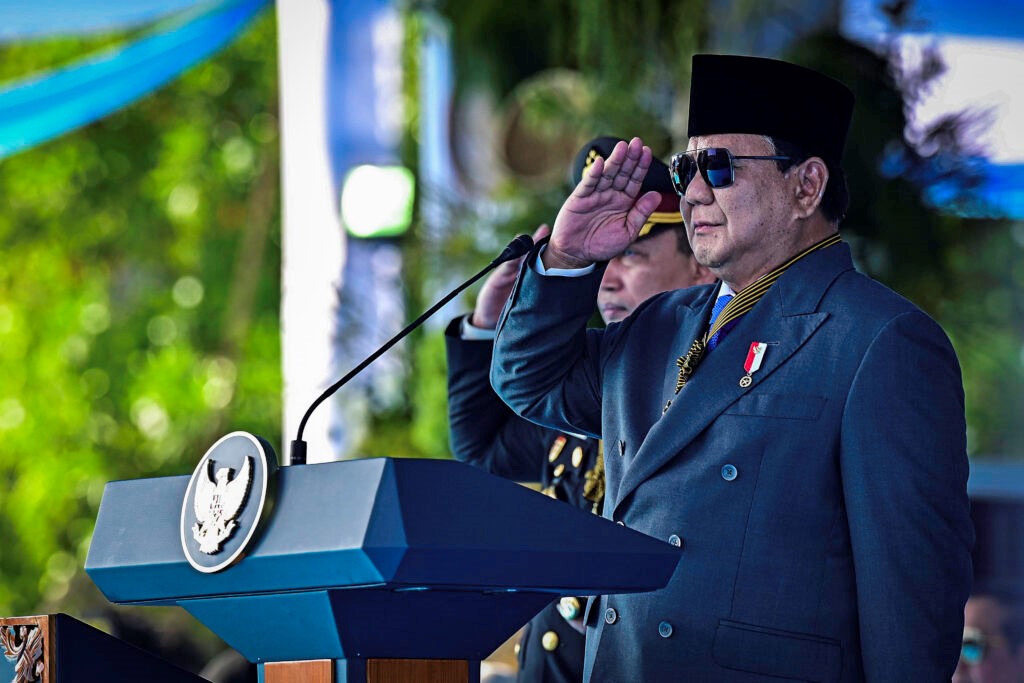President Jokowi: New Capital Part of Indonesia’s Big Transformation

President Jokowi delivers speech on the 67th Anniversary of Parahyangan Catholic University, in Bandung, West Java province, Monday (01/17). (Photo by: Oji/PR)
Indonesia’s new capital is part of the massive transformation in the country, President Joko “Jokowi” Widodo has stated.
“The new capital city is not merely a move of government offices. The main goal is to build a smart city—a new city that is competitive at the global level—, to build a new locomotive for the transformation of our country, towards an innovation and technology-based Indonesia with a green economy. This is where we will start,” the President said during the 67th Anniversary of Parahyangan Catholic University, in Bandung, West Java province, Monday (01/17).
He went on to say that the construction of the new capital city in East Kalimantan province should be used as a momentum to build a healthy, efficient and productive city that is designed from the start. He said that the new capital will be built pedestrian-friendly and bike-friendly as well as has world-class security, health services and education.
“This new capital is not just a city that contains government offices, but we want to build a new smart metropolis that can become a magnet, become a global talent magnet, and become a center of innovation,” he said.
On that occasion, President Jokowi once again said that the major transformation that was being carried out by Indonesia must continue.
“The COVID-19 pandemic must not stop the big transformation. We must continue the big transformation,” he said.
Moreover, the President explained a number of transformations that are being carried out in the country. First, the Government is accelerating economic transformation towards an economy that has high added value. One of the efforts is to stop exporting raw materials from mining industry gradually and encourage industrial downstreaming.
“Since 2020, I have said that we cannot continue like this. We stop exporting nickel raw materials. It must be produced in our own country, either into finished goods or semi-finished goods, but not raw materials,” he said.
After nickel, the Government will also gradually stop exports of other raw materials, such as bauxite and copper.
“We want the added value for the country so that apart from providing greater state revenue in the form of taxes, royalties, and non-tax, we can also create as many job opportunities as possible for our people,” he said.
Indonesia’s policy to stop nickel ore exports was challenged by the European Union to the World Trade Agency (WTO). President Jokowi also emphasized that the Government is ready to face a lawsuit over the policy to stop the export of raw materials.
“It’s not a big deal if other countries sue us. We can tell them that we want to open up as many job opportunities as possible for our own people. We will not stop it even if it is brought to the WTO. The bauxite export moratorium will still go on, the copper export will still stop. We want to create added value and we have to take advantage of science, take advantage of the latest technology,” he said.
In addition, the Government is also carrying out a transformation towards a green economy. These green economy products have high added value and are in great demand by the world community.
“We actually have resources. We have big resources to produce green products, because we have green energy. Our new renewable energy potential is 418 gigawatts, which means 418 thousand megawatts. That’s huge,” he said.
These energy sources include rivers, underwater currents, to geothermal. The President explained that currently the Government is building a green industrial area in North Kalimantan province covering an area of 16,000 hectares.
“This will be a gateway for a new Indonesia, which is to become a large industrial country and should be reckoned by the world. The gateway will be there, a green industrial area in North Kalimantan province. And hopefully, within 4-5 years it can be completed its first stage,” he said.
Another transformation carried out by Indonesia is in the field of the digital economy. The President said that Indonesia has great national economic potential.
“The digital market in Indonesia is growing very rapidly compared to that of other ASEAN countries. We predict that in 2025 our digital market will increase to US$146 billion. This means that the potential is Rp2,100 trillion. This is the opportunity for the young people, it should not be taken by other countries,” he said.
President Jokowi said that Indonesia has made a significant contribution to the digital economy in Southeast Asia with 40 percent market share. Indonesia also has 8 unicorn companies.
“We have 8 unicorns, the most in Southeast Asia. They are Traveloka, Tokopedia, Bukalapak, what else? We also have 1 decacorn, namely Gojek. The owner is here,” he said.
The President said that the Government continues to build supporting infrastructure for this digital transformation, starting from the Satria-1 multifunction satellite and Base Transceiver Station (BTS) in 12,500 villages and sub-districts that do not yet have 4G access, to the development of 5G networks.
Closing his statement, the President encouraged the Parahyangan University and universities throughout Indonesia to contribute to the transformation of Indonesia.
“I expect the contribution of the Parahyangan University and universities throughout Indonesia to the transformation of Indonesia, contributing through superior human resources, through scientific and technological innovation, through real works for the progress of Indonesia,” he said. (TGH/UN) (EST/MMB)








